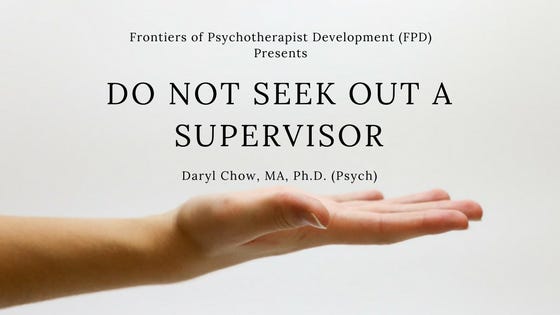Do Not Seek Out A Supervisor
Updates from
Frontiers of Psychotherapist Development
At the Bleeding Edge of Development, Reaping Benefit for Our Clients.
In the 08/23/2017 edition:
*|MC:TOC|*
Do Not Seek Out A Supervisor
By darylchow on Aug 22, 2017 04:26 pm
Seek out a portfolio of supervisors, mentors and coaches.
The apprenticeship model of clinical supervision certainly has its merits. It takes us beyond what we read and what we derive from experience in clinical practice. After all, clincial supervision has been defined as the “signature pedagogy” of our field.[1]
However, clinical supervision as we know it, has little to no impact on our actual improvement. If we are to truly develop, and have a deep impact on our clients’ lives, we need to take a more expansive view about this master-apprentice model of professional development.
Instead of enlisting a supervisor for guidance,
we should instead build a portfolio of supervisors, mentors, and coaches.
No one person has all the keys to guide you. It would be unwise to expect to learn everything from one teacher. Instead, we need to first identify areas that we have gaps in our knowledge, and then seek out coaches in that particular domain of expertise.[2]
Do your prep before you approach your guides. Figure out what you need to be working on. Make it concrete and write them down. (It’s not enough to just think about them in your head). Date it. When you look back, you get a sense of your evolution.
Remember: Keep one eye on your performance (i.e., client outcomes), and the other on your development (i.e., how you are learning).[3] Enlist the community of guides to make sure you have both eyes focused on where it should be.
Surround yourself with people that can help you become a better version of yourself, not become a mimicry of them.
Your Partner in Crime,
Daryl
~
Notes:
[1] Watkins, C. E. (2010). Psychotherapy supervision since 1909: Some friendly observations about its first century. Journal of Contemporary Psychotherapy, 1-11.doi:10.1007/s10879-010-9152-2
[2] Some of these terminologies were borrowed from Dorie Clark’s book, Reinventing You.
[3] Chow, D. (2017). The practice and the practical: Pushing your clinical effectiveness to the next level. In D. Prescott, C. Maeschalck, & S. D. Miller (Eds.), Reaching for Excellence: Feedback-Informed Treatment in Practice: APA.
Recent Articles:
Our Real Work
Stop Talking, and Start Performing.
Signs That Therapists are Barking Up the Wrong Tree in Our Professional Development
Mastery Learning for Therapists: Figure Out the What Before the How
What Have You Changed Your Mind About?






